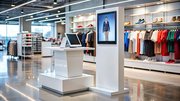Article
How Target is embracing the human touch to beat the competition
Instead of resisting change when new competitors such as e-commerce retailers and on-demand delivery services came into the market, Target is investing in its digital infrastructure to meet the needs of changing shopping habits.

April 26, 2018 by Elliot Maras — Editor, Kiosk Marketplace & Vending Times
Brick-and-mortar retailers are facing increasing competition from e-commerce players, on-demand delivery services and industry factors, but retailers that embrace change, and know how to do it, can come out on top.
Target CEO Brian Cornell shared his own company's experience as an example of how a retailer can welcome change and find success during a keynote presentation at the recent ShopTalk conference in Las Vegas.
All retailers, said Cornell, get to a point where the business model and customer expectations begin to diverge. And in recent years Target was no exception.
New realities emerge
Changing retail realities came to a head for Target when it launched a partnership with Lilly Pulitzer in 2015, offering the luxury apparel on its website.
"Our guests lined up early and picked the shelves clean," Cornell said. "Heavy demand brought our website to its knees." One option was to take limited-time offers offline and require customers to visit stores to buy from the selection. But that was not the chosen path.
The company had already faced new realities when Amazon introduced its Price Check app, allowing customers to scan an item at a brick-and-mortar location to investigate finding the product at a lower price online.
"If you're Target, this wasn't exactly great news," Cornell said. "Do you block the app and shut down all the Wi-Fi in the stores?" he added.
Also in play was the rise of on-demand delivery services such as DoorDash, Hello Fresh, Deliv, Posmates, GrubHub, Shopify, UberRUSH and Blue Apron.
All of these retail options were fast changing customer shopping habits in ways that threatened the infamous 'Target run,' where customers came to the store to get a particular item but left with several products.
Target embraces change
But, rather than fighting the changes, Target decided to embrace them.
"These weren't tough decisions at all," Cornell said. "Because our guests had already decided for us. Their expectations around transparency, speed, simplicity, ease, convenience — they had changed. Technology was just the accelerant."
Target's response was to boost its investment in digital capabilities.
"Instead of taking limited-time offers offline, we built a better digital experience," Cornell said. The company also improved the user experience to the point that shopping digital channels provided the same experience as shopping in stores, he added.
Instead of blocking the Amazon app or pulling the plug on Wi-Fi to prevent customers from using it in Target stores, Target built a faster network to support digital offerings. It also developed Cartwheel, an online platform that offers customers access to deals and discounts via social media.
"We 'leaned' into mobile and new payment methods," said Cornell.
A new 'Target run'
As for the 'Target run,' it's still as strong as ever.
"Today I can tell you that it is easier than ever, and completely done on our guests' terms," Cornell said, and even more prevalent as it's no longer restricted to consumers visiting a physical store. Customers can shop online and use the Google Home voice assistant.
"In fact, they can skip the (physical) trip altogether and go straight to their phones or their smart speaker — with Google Home, you don't even have to type," explained Cornell. Guests can pick up an order in the store or drive up and have the package placed in their vehicle. Target employees will deliver a package to a customer's doorstep or even their kitchen table.
"Today, it's totally up to them [consumers]," Cornell said, noting Target customers don't want to make choices or trade offs.
"They love to shop. Our job is to make it easier than ever."
A new multi-year plan
In addition to expanding its digital capabilities Target established a multi-year plan aimed at modernizing every aspect of its business.
The journey began with investing in its people, which includes being a leader in promoting higher wages, adding more payroll hours, and hiring and training for specialized service. The company recently decided to raise its starting wage to $12. Beyond wages, the company is also investing in training.
"In certain categories, they [consumers] want someone there that's an expert," Cornell said, citing Target provides expertise in beauty, apparel, technology, and food and beverage.
There is also a focus on creating more connected digital and physical shopping experiences.
It's all about delivery, shipping
Target recently introduced a free, two-day shipping option, while same-day delivery is being introduced to New York City, Boston, Chicago, San Francisco and Washington, D.C. in partnership with Grand Junction.
A key development on the delivery front has been the company's December acquisition of Shipt. Besides providing a delivery service, Shipt brought a loyal membership base to Target, along with a roster of retail partners. Shipt scaled from one market to more than 70 in its first three years, noted Cornell.
Cornell then introduced Bill Smith, Shipt's founder and CEO, onto the stage to expand on the consumer expectation for same-day delivery.
Target chose to partners with Shipt since it wanted to be able to offer same-day delivery nationwide. One reason they chose Shipt was because its model was focused on building relationships with customers. Interviews with Shipt customers confirmed this.
Asked how Target fit into Shipt's vision, Smith said Target provided the "jet fuel" for the vision Shipt set out to build. In building a marketplace, one of the hardest components is customer acquisition, Smith said. Target provided a huge customer base.
Commerce and community
When asked how Target is distinguishing itself from the competition, as both Amazon and other competitors are expanding delivery options, Cornell said Target stores are now serving as a place for community.
"In today's environment, we know our stores can play multiple roles," he said.
The stores are also used as fulfillment centers for home deliveries.
"Now, with Shipt, the team will be shopping our stores and interacting with the end user to let them know the order's complete, is there anything else you want to add on, and driving that last mile to put it on their kitchen counter," he said.
The human touch, said Cornell, will separate Target from the competition.
About Elliot Maras
Elliot Maras is the editor of Kiosk Marketplace and Vending Times. He brings three decades covering unattended retail and commercial foodservice.
 ChatGPT
ChatGPT Grok
Grok Perplexity
Perplexity Claude
Claude




